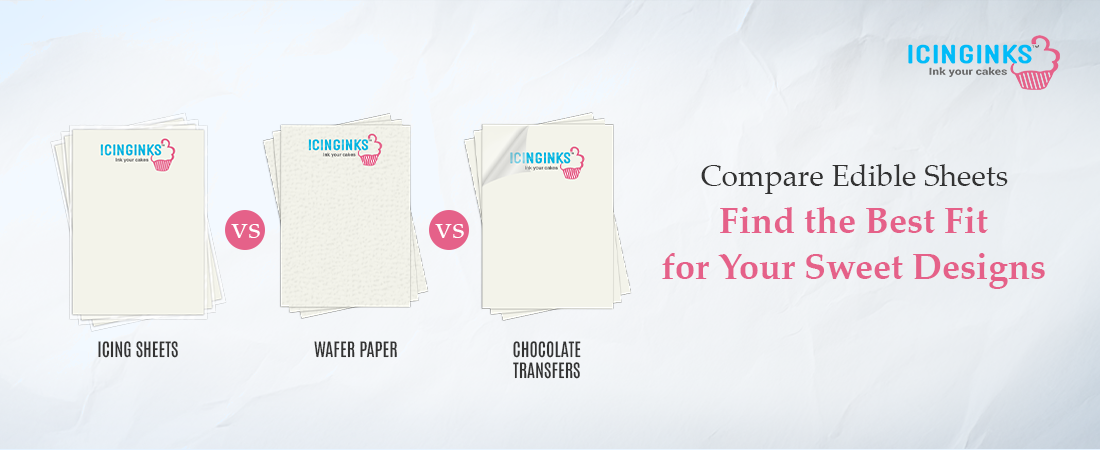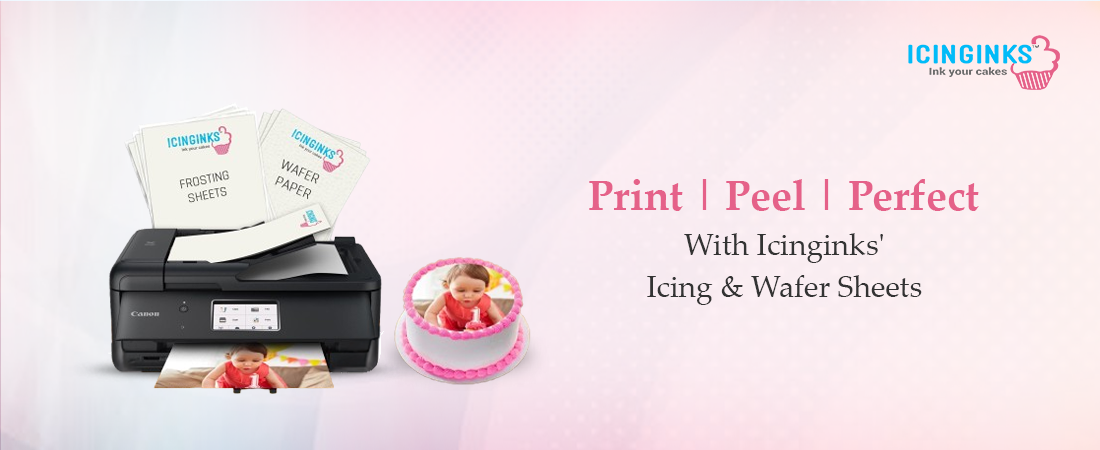
When it comes to edible decorations, choosing the right medium can make a big difference in your dessert presentation. Whether you’re a home baker or a professional cake decorator, you’ve likely encountered the three most popular edible printing surfaces: icing sheets, wafer paper, and chocolate transfer sheets. Each has its own set of characteristics, ideal uses, and unique strengths. In this blog, we'll explore the differences between these edible tools to help you decide which one best suits your sweet creations. Let's begin with the most versatile of the three: the icing sheet.
What Are Icing Sheets?
Icing sheets are thin layers of icing pressed onto a backing sheet, usually made of plastic. These sheets are designed to work seamlessly with edible ink printers, allowing high-resolution images and vibrant colors to be printed directly onto them.
They are known for their smooth texture, which makes them ideal for detailed image printing. Once printed, icing sheets can be easily peeled off and applied to a variety of dessert surfaces, including cakes, cookies, cupcakes, and even fondant.
Best Uses for Icing Sheets:
- Full-photo cakes and edible logos
- Custom printed cookies
- Detailed or multi-color designs
- Smooth fondant or buttercream surfaces
Icing sheets are a go-to choice for bakers who want precision, clarity, and flexibility in their designs. Their ability to hold color without bleeding or fading is one of their strongest selling points.
What Is Wafer Paper?
Wafer paper, also known as rice paper, is made from potato starch, water, and vegetable oil. It's thinner and more delicate than icing sheets, with a slightly translucent appearance. While it doesn’t offer the same level of print quality as an icing sheet, it has other advantages.
Wafer sheets are ideal for creating lightweight decorations, such as flowers, feathers, or butterflies. They're easy to cut and shape, making them a favorite for 3D edible creations. Unlike icing sheets, they don’t require a backing sheet and are more cost-effective.
Best Uses for Wafer Sheets:
- Edible paper flowers
- Feathers, leaves, or lace designs
- Light, airy decorations
- Minimalist image transfers on dry surfaces
However, wafer paper is more prone to wrinkling or curling in high humidity and doesn’t perform well on moist surfaces. For simple, elegant accents with a natural look, wafer sheets offer a delicate and economical option.
What Are Chocolate Transfer Sheets?
Chocolate transfer sheets are made from acetate and are coated with a layer of colored cocoa butter. These sheets are used to imprint designs onto chocolate by placing the sheet ink-side down onto melted chocolate. As the chocolate sets, the design transfers from the sheet onto the chocolate surface.
This technique opens up a world of artistic expression in molded chocolates, chocolate bars, and decorative chocolate accents.
Best Uses for Chocolate Transfer Sheets:
- Custom chocolate bars
- Bonbons and truffles
- Chocolate plaques and garnishes
- Branding and logo printing on chocolate
Chocolate transfer sheets are not compatible with edible ink printers but are instead pre-printed or custom-designed using specialized cocoa butter printers. The result is a glossy, professional-quality design embedded in the chocolate itself.
Which One Should You Choose?
The right edible sheet depends on your project type, budget, and design needs. Here are some decision-making tips:
Choose Icing Sheets If:
- You need photo-quality images
- Your project requires precise color and detail
- You’re decorating cakes or cookies with smooth surfaces
Icing sheets are the most versatile and beginner-friendly option among the three. They’re easy to print, cut, and apply, making them ideal for both professionals and hobbyists.
Choose Wafer Sheets If:
- You want delicate, lightweight decorations
- Your designs are more artistic than photo-realistic
- You're working on 3D elements or budget-conscious projects
Wafer paper is great for embellishments that require structure without weight. It's a smart choice for floral designs or thematic cake accents.
Choose Chocolate Transfer Sheets If:
- You’re working with molded or tempered chocolate
- You want a polished, professional chocolate finish
- You have access to pre-designed or cocoa butter printers
Chocolate transfer sheets elevate your chocolate work from homemade to high-end. They provide a smooth, intricate finish that’s visually striking and appealing to clients.
Final Thoughts: The Right Sheet for the Right Sweet
In the world of edible design, there is no one-size-fits-all. Whether you opt for an icing sheet, a wafer paper design, or a luxurious chocolate transfer, each tool has its place in your creative arsenal. The key is understanding the strengths and limitations of each material.
For most edible image needs, icing sheets stand out for their clarity, reliability, and ease of use. If you’re looking to print lifelike portraits or logos or need a dependable sheet for varied applications, icing sheets are your best bet.
But don’t shy away from wafer paper and chocolate transfer sheets. They each bring something special to the table and can help you take your edible art to new heights. Explore each option and let your creativity (and taste buds) guide the way. With the right edible sheet, your desserts can truly become masterpieces.
Transform Desserts with Icinginks’ Premium Edible Sheets

At Icinginks, we empower bakers and chocolatiers with top-tier edible solutions: our vibrant icing sheet, delicate wafer sheet, and luxurious chocolate transfer sheet are your secret ingredients to professional-looking creations. Our icing sheet delivers flawless, high-resolution prints that cling seamlessly to smooth cakes and cookies. The wafer sheet provides a lightweight canvas for stunning 3D flourishes, such as flowers and lace details. Meanwhile, our chocolate transfer sheet brings intricate cocoa-butter designs to life on molded chocolate; just print, press, and pour!
Each product is FDA-compliant, easy to use with Canon edible-ink printers, and crafted to ensure crisp, faithful image transfer. Enhance your baking artistry today by exploring our range!
FAQs
1. Can I use the same printer for icing sheets and wafer sheets?
Yes, both icing sheets and wafer sheets are compatible with edible ink printers. However, for best results with photo-quality images, icing sheets are preferred due to their smoother surface and higher absorbency.
2. Are icing sheets safe to eat?
Absolutely. Icing sheets are made from FDA-approved ingredients like starches, sugar, and food-grade glycerin. They are safe for all ages and dissolve easily when applied to moist surfaces.
3. What’s the main difference between wafer sheets and icing sheets?
Wafer sheets are thinner, more translucent, and typically used for 3D edible decorations, such as flowers or feathers. Icing sheets are thicker, provide vibrant image quality, and are best for flat surfaces like cakes and cookies.
4. Can I use chocolate transfer sheets on buttercream or fondant?
No, chocolate transfer sheets are specifically designed for melted chocolate. They do not adhere to buttercream or fondant and require heat from the melted chocolate to transfer the design properly.
5. How long do icing sheets and wafer sheets last?
When stored properly in a cool, dry place, both icing sheets and wafer sheets can last up to 12 months. Ensure they are kept sealed in airtight packaging to prevent drying or curling.
6. Do I need special tools to use chocolate transfer sheets?
Not necessarily. All you need is tempered or melted chocolate and a flat surface. Simply place the chocolate transfer sheet design-side down onto the chocolate, allow it to set, and then peel it off to reveal the design.
Similar Post:
Frosting Sheets or Wafer Sheets – What Works Best for Decorating Cakes
Icing Sheet or Wafer Paper – Which Edible Paper to Use and When?
What is the Difference Between Wafer Papers and Frosting Sheets?
Edible Sugar Sheets: An Easy Step-by-Step Guide
Top-Rated Edible Sheets Perfect for Your Bakery Business!




